Are you planning to travel the off-the-beaten-path, spectacular Ha Giang Loop by car? Riding the Ha Giang Loop by motorbike is a popular adventure for many but if you are not confident about going by motorbike, travelling by private car in an organised tour is the next best thing.
Ha Giang is located in northern Vietnam and is known for its stunning scenery, rugged landscapes, and diverse ethnic culture. One of the best ways to experience the area is to undertake the Ha Giang Loop, a popular Vietnam road trip among adventurers that navigates through the region’s famed mountainous terrain. This informative guide provides all the necessary details on how to embark on this journey, the best time to visit, what to pack, and what to see along the way.

You can join our private Facebook Group – Vietnam Travel Planning Group here. We set up the group to assist you in planning your travels in Vietnam.
This post may contain affiliate links. Please see our disclosure for more information
Where is Ha Giang?
Ha Giang Loop Map
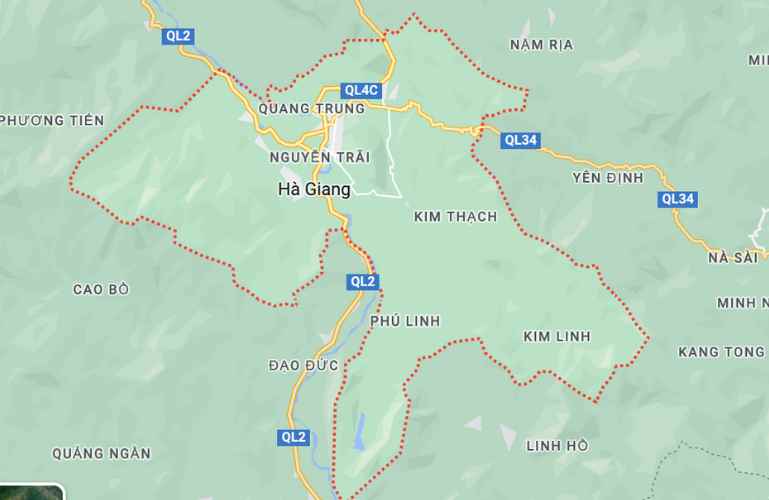
Ha Giang is located in northern Vietnam, near the border of China. It is a rural province with a population mainly of ethnic minorities. Ha Giang is known for its breathtaking scenery, including limestone peaks, steep, winding valleys, and terraced rice fields.
Do you need a Vietnam Visa? Check here
Distance from Hanoi to Ha Giang
The distance from Hanoi to Ha Giang is around 300 kilometres. The route to Ha Giang is scenic but long, with winding roads.
The travel time from Hanoi to Ha Giang is around six to ten hours, depending on whether you are travelling by car or bus, traffic and weather conditions.
Have you taken out travel insurance yet? Click here for a free quote.How to get to Ha Giang from Hanoi
There are many ways to get to Ha Giang from Hanoi, including buses, private cars, and motorbikes.
For bus and car/van transport there are many options available.
Book Accommodation in Hanoi here
How To Do The Ha Giang Loop By Car From Hanoi
The best option is to book a four-day tour from Hanoi, which includes:
- air-conditioned car
- accommodation at home stays or 3 star hotels
- English-speaking licensed travel guide
Ha Giang Loop 4-day itinerary by car from Hanoi
Day One Hanoi to Quan Ba (Lunch and dinner included)
Depart Hanoi from your hotel at 8.00 am.
Travel to the Quan Ba district of Ha Giang province stopping along the way for photo opportunities.
Once you have arrived in the Ha Giang region you travel through some local Hmong villages on your way to your first night’s accommodation in a homestay in a Yao ethnic village.
Day Two – Quan Ba to Yen Minh to Dong Van (Breakfast, lunch and dinner included)
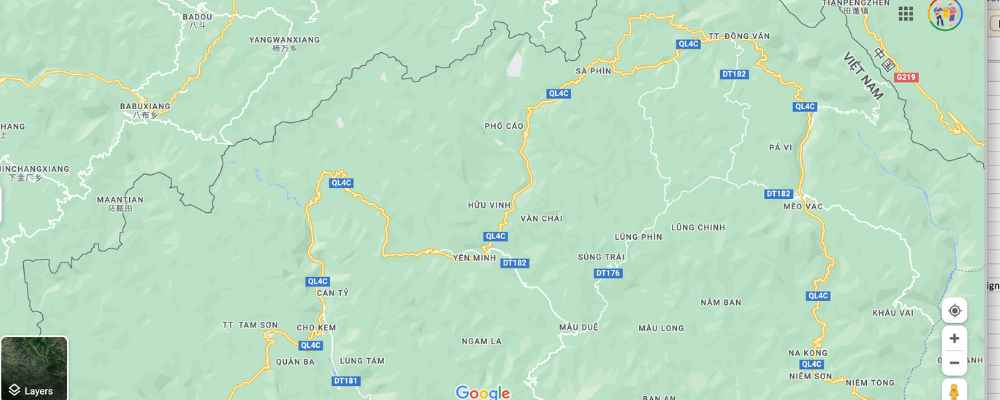
After breakfast visit the village of Nam Dam before heading to Yen Minh for lunch. After lunch, a planned 1.5 hour walk near Lung Cam Village to see and learn how the local Hmong people live. A visit is also planned to the King of Hmong Palace.

The Palace of the Hmong Kings is located in the village of Sa Phin about 415 km from Hanoi and 130 km from Ha Giang. The palace was built in 1902, taking 8 years. Two rulers occupied the Palace, the first supported the French whilst the second ruler supported Ho Chi Min’s fighters.
Legend states that the Palace was built on the principles of Feng Shui.
After visiting the Palace you are taken to your hotel in Dong Van. Depending on what time you arrive you can take a walk behind the hotel up to the French Fortress to admire the views at sunset.
Day Three – Dong Van – trek in Ma Pi Leng Pass – Meo Vac – Ha Giang (Breakfast, lunch and dinner included)

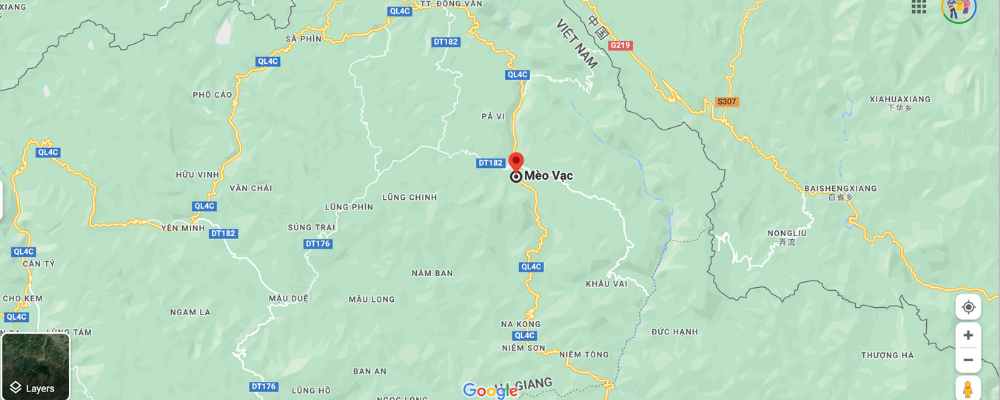

After breakfast enjoy some time at the local Dong Van market if you are visiting on a Sunday. It is located in the Old Quarter of Dong Van where you can wander if the market is not on. The Dong Van Market is an excellent place to see the ethnic minority cultures and get a taste of their delicious local food.
1.5 hour trek has been organised in the Ma Pi Leng Pass, one of the 4 great passes located in Northern Vietnam. The views are outstanding as you wind your way down the mountain to the river through local Hmong villages.
Make sure you have some good walking shoes for the trek.
Return back to Ha Giang for the night.
Day Four – Ha Giang to Hanoi (Breakfast and lunch included)
After breakfast, you have time to visit the Tay ethnic minority before travelling the 5 – 6 hours back to Hanoi.
For checking availability and bookings:
Best Months to Visit Ha Giang
The best months to visit Ha Giang are from September to November when the golden rice fields are in full bloom, and the buckwheat flowers start to show their vibrant colours. The weather during these months is also pleasant, with temperatures ranging from 15 to 25 degrees Celsius.
The weather from November to March can be quite cold, with temperatures dropping as low as 5 degrees Celsius. Therefore, it is important to pack warm clothes, including a wind jacket and a rain jacket during this period.
During the dry months from October to April the roads are safer to travel on, so consider travelling during this time but remembering how cold it can be.
From June to August, the weather is hot and humid, with temperatures rising above 30 degrees Celsius. Therefore, it is important to pack summer clothes and a wind jacket, as the evenings can still be chilly. July and August are known for regular monsoons, which can affect travel plans, so it is always a good idea to check the weather forecast before embarking on the trip.
Always consider that the weather could be unpredictable and be prepared for rain, sun, fog, hot and cold.
Make sure you take sunscreen and a water bottle too!
Is Ha Giang worth visiting?
Ha Giang is definitely worth visiting, as it offers a unique and truly authentic experience. It is home to some of Vietnam’s most remote and rugged areas, with a great opportunity to engage with different ethnic cultures. The scenery is some of the most spectacular in Southeast Asia, with limestone karsts towering over deep gorges, terraced rice fields, and rugged mountain terrain.
Make sure you have your camera with you, a popular camera Canon GT X Mark II.
We travel with a portable power bank it has come in handy, especially during long days of travel.
What to see along Ha Giang Loop?
Ha Giang City
This charming city is the starting point of the Ha Giang Loop tour. It boasts of French colonial architecture and traditional stilt houses. It is located on the banks of the River Lo. Ha Giang City is the capital of the province of Ha Giang.
Quan Ba Twin Mountains

A striking natural attraction, these twin mountains are known for their unique rock formations that resemble two breasts. They offer spectacular views of the surrounding countryside. Located around 40 km from Ha Giang town on Highway 4C. From Heavans Gate Pass you have great views of the Quan Ba Twin Mountains.
Dong Van Old Quarter
This is a UNESCO World Heritage site located in Dong Van town. It consists of traditional Hmong houses and is a popular spot for photo opportunities. Some homes are over 200 years old in the town.
Lung Cu Flag Tower

Located in Dong Van district, this tower marks the northernmost point of Vietnam. It’s a popular site for its panoramic views of the surrounding mountains and valleys.
Ma Pi Leng Pass

This is one of the most dangerous mountain passes in Vietnam, and the views from the top are breathtaking. It’s an ideal spot to stop for photos or to take in the scenery.
Ban Gioc Waterfall

This waterfall is located near the Chinese border and is the largest waterfall in Vietnam. It’s a popular tourist spot for its stunning natural beauty.
Is Ha Giang Loop dangerous?
The Ha Giang Loop route can be challenging, as the roads are steep, winding, and sometimes unpaved. In wet weather, the roads can become slippery and there is a risk of landslides, which can cause road closures.
It is important to take precautions, including wearing a helmet if you are riding a motorbike and driving slowly on winding roads. Some sections of the routes are in need of repair, and potholes can be common, so it is crucial to choose a reliable and well-maintained vehicle before setting out.
Conclusion
In summary, the Ha Giang Loop tour provides the perfect opportunity for those who want to experience the wilderness of Vietnam’s northern region. With its stunning scenery, diverse ethnic culture, and challenging roads, the Ha Giang Loop is a must-visit destination for adventurous travellers. By following this Ha Giang loop guide, visitors will be well prepared to embark on this tour, with a better understanding of what to expect, the best time to visit, and what to see along the way.
Book Now: 4 Day Hanoi Ha Giang Loop Tour by Car hereAre you on Pinterest? We are at To Travel Too and we have many travel-related boards check us out at Pinterest. If you enjoyed our article why not pin it to your board and read it later?

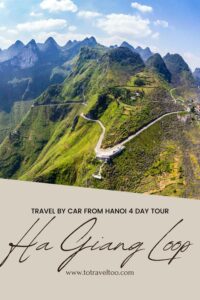
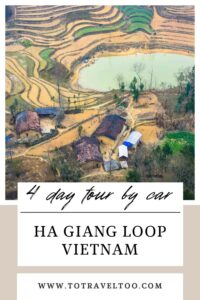





What a gorgeous place guys. Driving carefully makes sense in such an environment. Wear helmets on motorbikes, always. Fabulous region too. We visited Ninh Binh and were stunned at its natural beauty. Staggering, really.
Ryan
Vietnam is so beautiful! Glad you were able to visit.
We spent a week doing this and it was amazing. A private guided tour is a great way to visit as it gives you access to people and places that see few other tourists.
Such beautiful scenary! Amazing place!